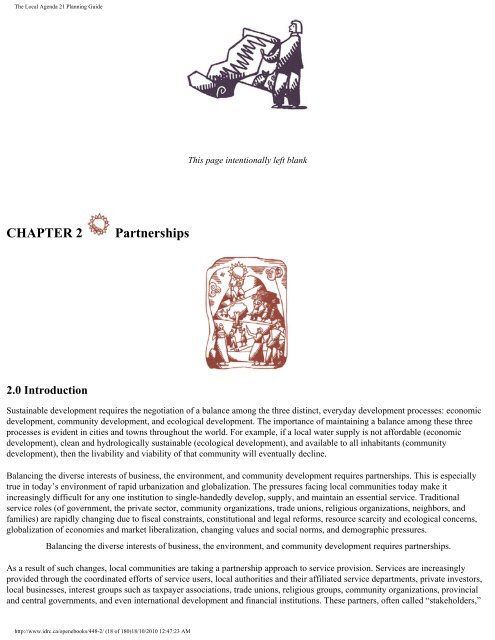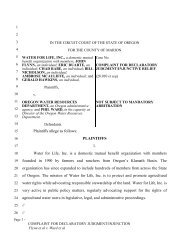The Local Agenda 21 Planning Guide - Democrats Against UN ...
The Local Agenda 21 Planning Guide - Democrats Against UN ...
The Local Agenda 21 Planning Guide - Democrats Against UN ...
Create successful ePaper yourself
Turn your PDF publications into a flip-book with our unique Google optimized e-Paper software.
<strong>The</strong> <strong>Local</strong> <strong>Agenda</strong> <strong>21</strong> <strong>Planning</strong> <strong>Guide</strong><br />
This page intentionally left blank<br />
CHAPTER 2<br />
Partnerships<br />
2.0 Introduction<br />
Sustainable development requires the negotiation of a balance among the three distinct, everyday development processes: economic<br />
development, community development, and ecological development. <strong>The</strong> importance of maintaining a balance among these three<br />
processes is evident in cities and towns throughout the world. For example, if a local water supply is not affordable (economic<br />
development), clean and hydrologically sustainable (ecological development), and available to all inhabitants (community<br />
development), then the livability and viability of that community will eventually decline.<br />
Balancing the diverse interests of business, the environment, and community development requires partnerships. This is especially<br />
true in today’s environment of rapid urbanization and globalization. <strong>The</strong> pressures facing local communities today make it<br />
increasingly difficult for any one institution to single-handedly develop, supply, and maintain an essential service. Traditional<br />
service roles (of government, the private sector, community organizations, trade unions, religious organizations, neighbors, and<br />
families) are rapidly changing due to fiscal constraints, constitutional and legal reforms, resource scarcity and ecological concerns,<br />
globalization of economies and market liberalization, changing values and social norms, and demographic pressures.<br />
Balancing the diverse interests of business, the environment, and community development requires partnerships.<br />
As a result of such changes, local communities are taking a partnership approach to service provision. Services are increasingly<br />
provided through the coordinated efforts of service users, local authorities and their affiliated service departments, private investors,<br />
local businesses, interest groups such as taxpayer associations, trade unions, religious groups, community organizations, provincial<br />
and central governments, and even international development and financial institutions. <strong>The</strong>se partners, often called “stakeholders,”<br />
http://www.idrc.ca/openebooks/448-2/ (18 of 180)18/10/2010 12:47:23 AM










